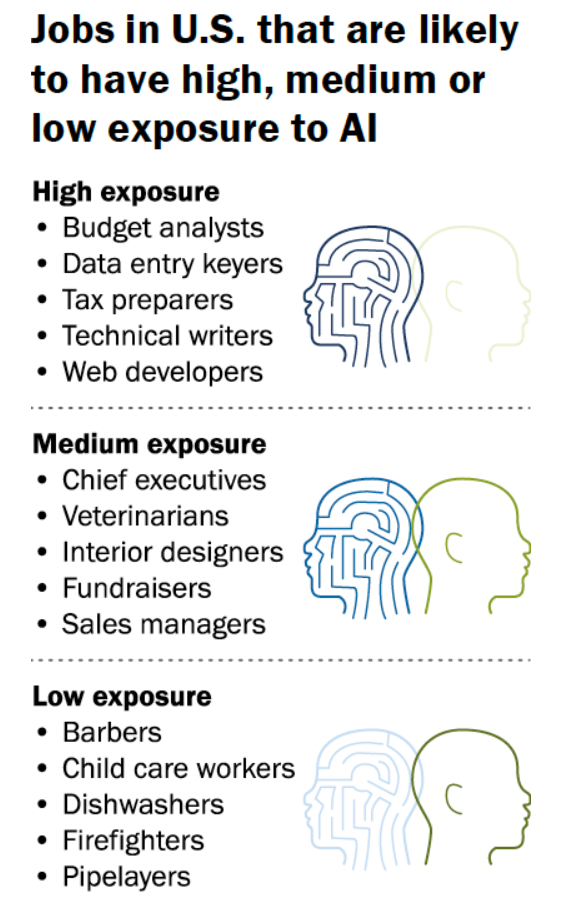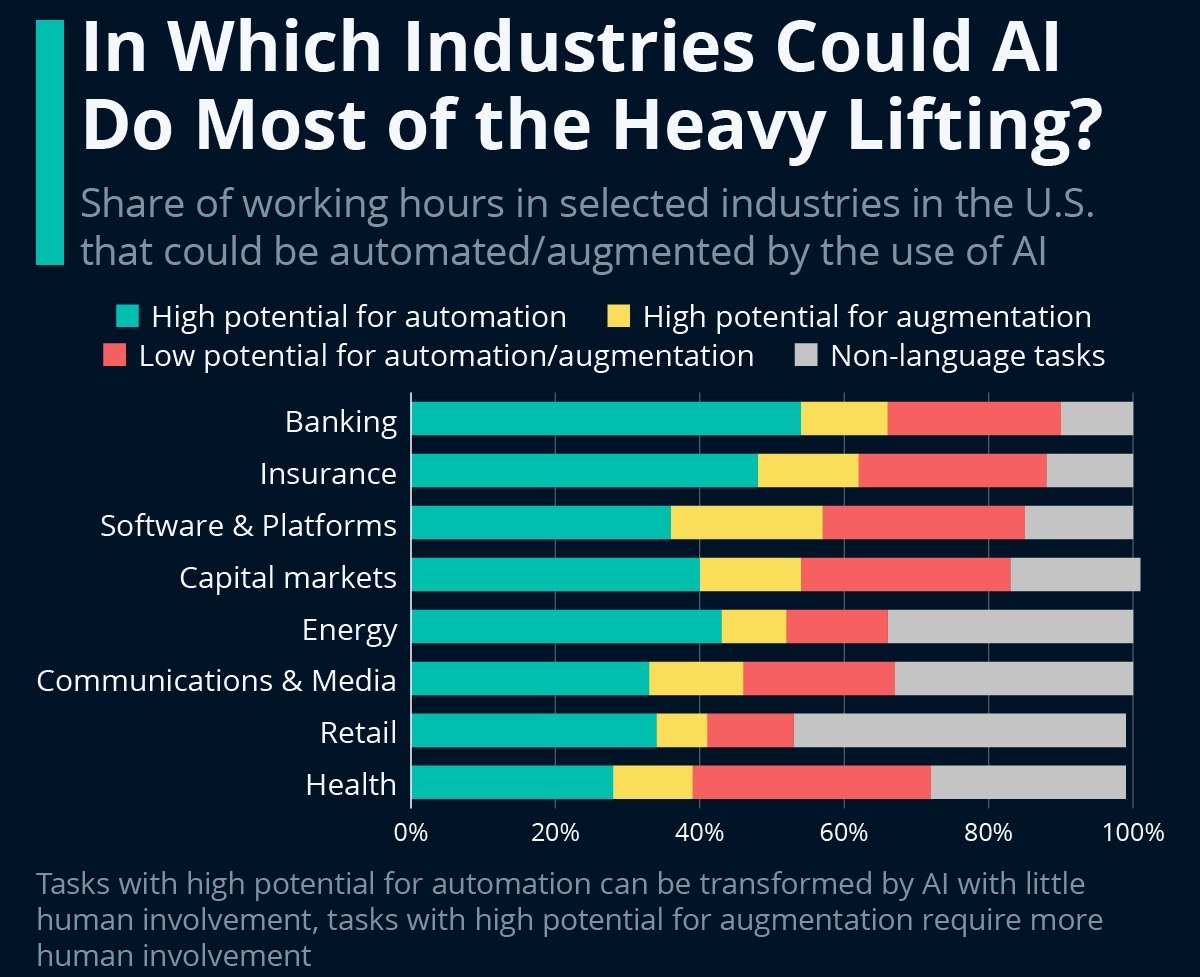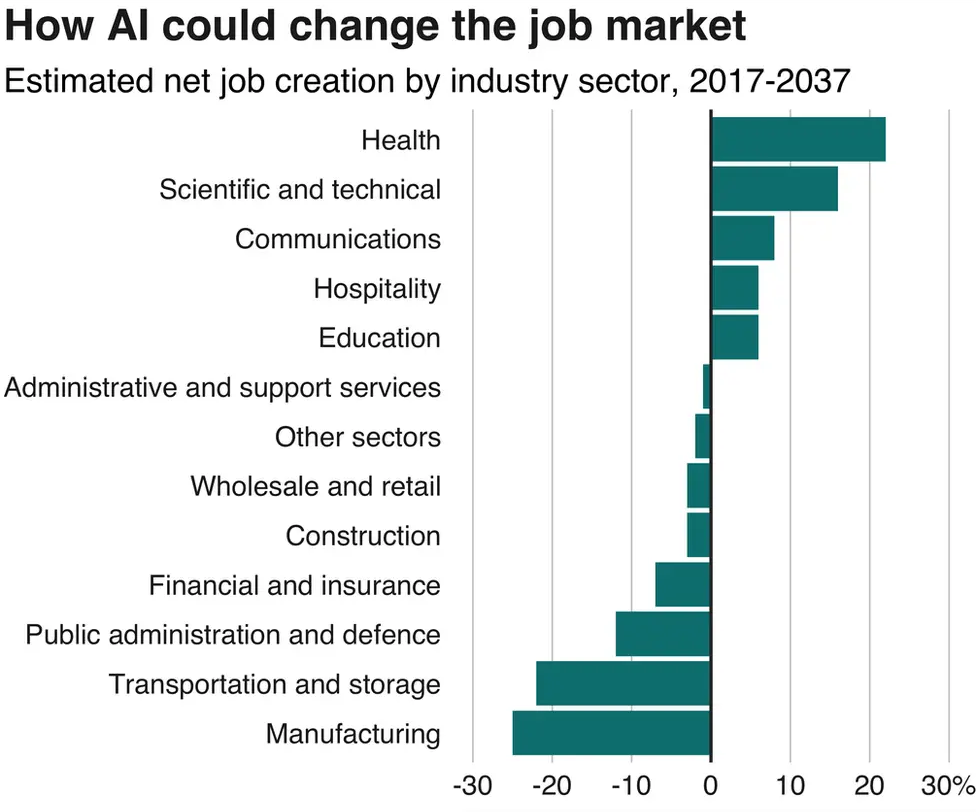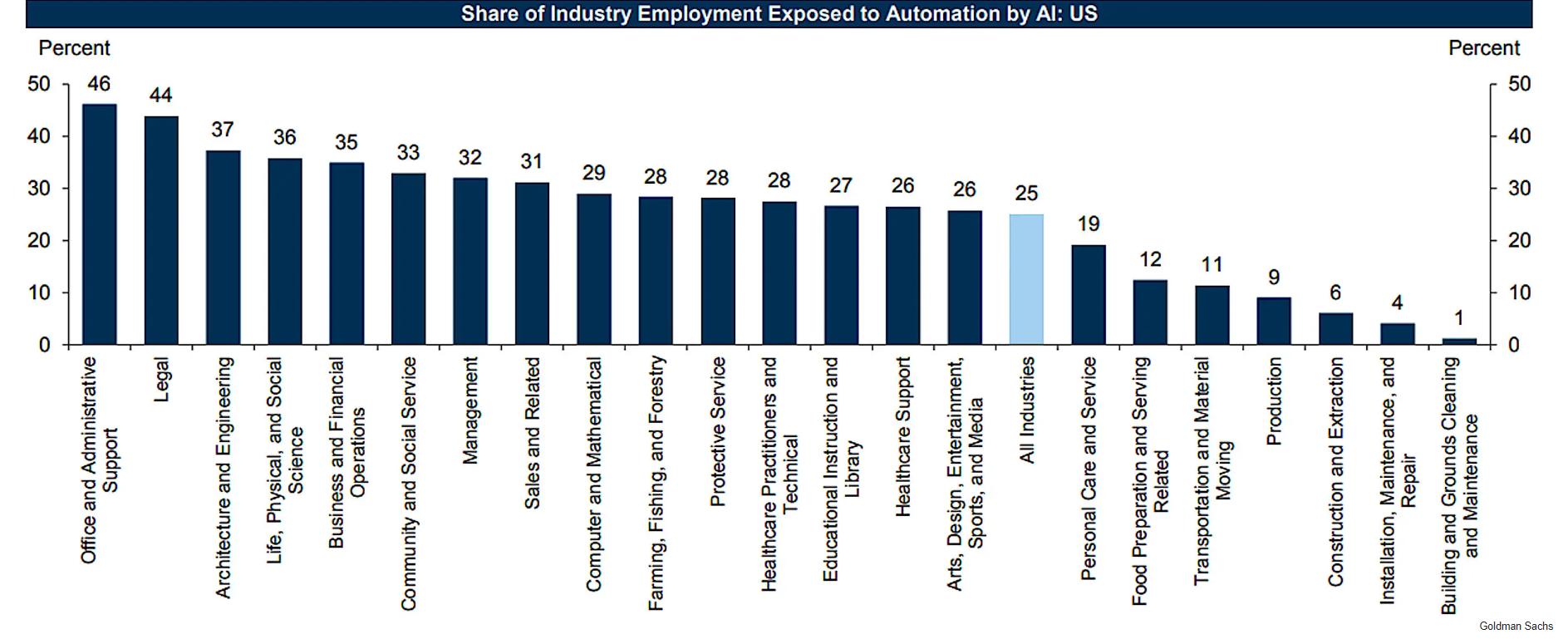Envision a bustling city in 2030, where robots are performing tasks previously done by human workers.
Welcome to the transformative world of artificial intelligence, where innovation not only reshapes industries but also creates a plethora of job opportunities. Contrary to the notion that AI might replace jobs, this cutting-edge technology is, in fact, a powerful engine for job creation.
As AI continues to advance, it opens doors to new roles, fosters skill development, and sparks demand for a diverse array of talents.
In this era of digital evolution, let’s explore how AI creates jobs and emerges as a dynamic force that actively contributes to the job market’s growth and diversity.
Table Of Contents:
- How AI Creates Jobs
- Sectors Benefiting from AI
- The Impact of AI on Job Quality
- Preparing for an AI-Driven Job Market
- Addressing Fears About Job Loss
- FAQs – How AI Creates Jobs
- Conclusion
How AI Creates Jobs
The impact of artificial intelligence on job creation is more than meets the eye. Contrary to popular belief, AI doesn’t just replace jobs; it creates them too.
How does AI create jobs?
To understand how AI creates jobs, let’s consider the impact computers had when they were first introduced. Initially feared as a massive job destroyer, they did end up creating an entire industry with millions of new roles.
Similarly, while some routine tasks may be automated by AI, there will always be a need for human oversight and creativity — something machines lack.
The need to oversee AI models has created new roles in the workforce that didn’t exist before, such as machine learning engineers or data scientists. These roles require a deep understanding of algorithms used in AI applications.
In addition to these tech-centric jobs, AI creates jobs in other fields like ethics consultants who navigate moral issues surrounding machine autonomy and bias within data sets.
Fueling Economic Growth Through Job Creation
With AI tools taking over mundane tasks previously done manually, full-time employees can now focus on strategic work which fuels economic growth — thereby leading to more employment opportunities.
This ripple effect isn’t limited only to specific industries but impacts the economy at large – meaning every sector sees potential for expansion due to advancements in artificial intelligence.
In essence, the fear of job losses due to automation should instead be viewed as a job shift. Though some existing jobs may become outdated, AI systems will create many more opportunities as the technology develops.
The secret sauce here lies in adaptability and lifelong learning. As the AI landscape continues to evolve, so too must our skills and abilities.

Source: Pew Research Center
Sectors Benefiting from AI
AI’s impact is akin to a ripple effect, touching various sectors and industries and transforming the way business leaders manage their human assets.
Here are several sectors that stand to benefit significantly from the integration of AI and how artificial intelligence creates new roles in each industry.
Healthcare
The healthcare sector is blossoming with the help of AI. From diagnostics to patient care to drug discovery, new roles are emerging daily.
A perfect example? Radiologists now use AI for faster medical diagnosis. It helps them spot abnormalities that might get overlooked otherwise. So you see, instead of replacing radiologists, we’re getting more efficient ones.
Positive Impact: AI will augment healthcare professionals’ capabilities by assisting in diagnostics, personalized treatment plans, and administrative tasks. This can lead to more accurate and efficient healthcare delivery.
Job Evolution: While routine manual tasks may be automated, healthcare workers will shift towards roles that require human interaction and empathy, complex decision-making, and collaboration with AI systems. New roles in AI system maintenance and oversight may also emerge.
Finance
Moving on to finance – ever heard about robo-advisors? These handy tools offer financial advice or investment management online with minimal human intervention.
AI has also created specialized roles in fraud detection and algorithmic trading, making our money safer and investments smarter. Chatbots and virtual assistants are also becoming commonplace in financial institutions.
But these bots need humans too. Who is going to ensure they stay current?
Positive Impact: AI in finance streamlines processes, reducing the need for manual data entry and repetitive tasks. It enhances decision-making through data analysis and risk assessment.
Job Evolution: Roles that involve complex problem-solving, strategic planning, and customer relations will become more prominent. Finance professionals may need to adapt by acquiring data analysis and AI oversight skills.
Education
AI is revolutionizing education with personalized learning experiences, intelligent tutoring systems, and automated grading. It adapts to individual student needs, making education more effective and accessible.
Positive Impact: AI allows educators to focus on individual student needs. It also facilitates data-driven insights for continuous improvement.
Job Evolution: Teachers may take on more facilitative roles, guiding students through personalized learning plans. AI specialists in education will be crucial for system maintenance, updates, and integration.
Retail
Retailers use AI for inventory management, demand forecasting, personalized recommendations, and customer service. Automated checkout systems and smart shelves are also becoming prevalent.
Positive Impact: AI optimizes inventory management, enhances customer experiences, and improves supply chain efficiency. It leads to more informed decision-making in pricing and product recommendations.
Job Evolution: While routine tasks like inventory counting may be automated, there will be an increased demand for roles in customer service and data management.
Manufacturing
AI optimizes manufacturing processes with predictive maintenance, quality control, and supply chain management. Robotics and automation, powered by AI, enhance efficiency and precision in production.
Positive Impact: AI in manufacturing leads to higher productivity and precision.
Job Evolution: Human workers will transition to roles that involve overseeing and maintaining AI-driven systems, as well as engaging in tasks that require human judgment, creativity, problem-solving, and adaptability.
Automotive
The automotive industry benefits from AI in the development of self-driving cars, predictive maintenance for vehicles, and smart traffic management.
Positive Impact: AI is integral to the development of autonomous vehicles, improving safety and efficiency.
Job Evolution: While some traditional roles may change, there will be a growing need for skilled professionals in AI system design, testing, and maintenance. New roles in AI-powered transportation services may also emerge.
Technology
Unsurprisingly, the tech industry itself is a major beneficiary. AI is integral to the development of new technologies, from advanced cybersecurity systems to virtual assistants and smart devices.
We’ve got everything from data scientists sifting through massive datasets for insights to ethical hackers ensuring our virtual world remains secure against cyber threats.
Positive Impact: AI drives innovation in the tech industry, leading to the development of new products and services. It enhances efficiency in software development and cybersecurity.
Job Evolution: Technology professionals will continue to focus on innovation, with an increased emphasis on AI integration, algorithm development, and cybersecurity measures.
Telecommunications
AI is employed in network optimization, predictive maintenance, and customer service in the telecommunications sector. It helps enhance the performance and reliability of communication networks.
Positive Impact: AI enhances the overall performance and reliability of communication networks.
Job Evolution: While routine maintenance tasks may be automated, there will be a growing demand for professionals with expertise in AI-driven network management and cybersecurity.
Energy
In the energy sector, AI is used for optimizing energy consumption, predictive maintenance of equipment, and improving the efficiency of renewable energy sources. It plays a crucial role in the transition to a more sustainable energy landscape.
Positive Impact: AI contributes to creating a more sustainable and efficient energy landscape.
Job Evolution: While routine tasks such as equipment monitoring may become automated, the energy sector will see an increased demand for skilled professionals in AI system maintenance, data analysis for energy optimization, and the development of innovative solutions for sustainable energy practices.
Human Resources
AI streamlines HR processes with resume screening, candidate matching, and employee engagement analysis. Chatbots also assist in answering employee queries and managing routine HR tasks.
Positive Impact: AI allows HR professionals to focus on strategic planning and employee development.
Job Evolution: HR professionals may shift towards roles that require emotional intelligence, strategic thinking, and employee engagement. There will also be a need for specialists in AI system oversight.
Agriculture
Precision farming is made possible by AI, which enables farmers to monitor irrigation, optimize crops, and predict yield. AI-powered drones and sensors contribute to more efficient and sustainable agriculture.
Positive Impact: AI will enhance precision farming, optimize crop management, and maximize resource usage.
Job Evolution: While some traditional farming tasks may become automated, there will be an increased demand for skilled workers in AI system maintenance, data analysis, and sustainable agriculture practices.
Entertainment
AI is transforming the entertainment industry with personalized content recommendations, content creation, and even virtual influencers.
Positive Impact: AI enhances user experiences in gaming, streaming, and digital media through personalized content creation.
Job Evolution: Content creators may collaborate with AI systems for content generation, and there will be an increased demand for professionals with expertise in AI content optimization and virtual experiences.
Supply Chain and Logistics
AI optimizes supply chain operations by improving demand forecasting, inventory management, and route optimization.
Positive Impact: AI optimizes supply chain operations — reducing costs, enhancing efficiency, and minimizing errors in inventory management and distribution.
Job Evolution: While routine tasks may be automated, there will be a growing demand for professionals in logistics and supply chain management with expertise in AI-driven optimization and oversight.
Real Estate
In the real estate industry, AI is utilized for property valuation, market analysis, and customer interactions.
Positive Impact: Virtual assistants and chatbots assist in answering queries, while AI algorithms can help in predicting property value trends. AI streamlines processes and improves decision-making.
Job Evolution: Real estate professionals may focus more on client relations, strategic planning, and utilizing AI tools for data-driven insights in property transactions.
Environmental Conservation
AI plays a vital role in environmental monitoring and conservation efforts. It is used for analyzing climate data, tracking wildlife, and managing resources more sustainably.
Positive Impact: AI contributes to the development of innovative solutions for addressing environmental challenges.
Job Evolution: Environmental scientists and conservationists may work alongside AI systems, utilizing data-driven insights for more effective conservation strategies. New roles in AI system oversight for environmental applications may emerge.
AI is revolutionizing the way we work, bringing with it a range of new opportunities. And this is only scratching the surface. With every sector benefiting from AI in some way or another, who knows what job titles we’ll see next?

Source: Statista
The Impact of AI on Job Quality
AI is no longer a concept of the distant future. It’s here, shaping our work lives in surprising ways.
Let’s dig deeper into how AI impacts job quality.
Improved Job Satisfaction
We often focus on job numbers when we talk about AI replacing humans. However, it’s crucial to consider another aspect — job satisfaction.
According to Forbes, there’s potential for improved work-life balance thanks to automation handling repetitive tasks.
A big chunk of satisfaction at work also comes from feeling productive. Routine jobs are being automated, giving existing employees more time to focus on creative and critical thinking tasks. This leads to higher job satisfaction as people feel their skills are put to better use.
Better Income Potential with AI Skills
For those tech-savvy or willing to learn, acquiring AI-related skills can open up a world of potential for increased income.
In fact, according to a Gartner report, by 2025 more than half of all traditional industries will have been transformed by digital business models driven largely by AI technology.
This means that those who master these tools will be ahead in the game when it comes to paychecks and promotions.
The Flip Side: Job Stress
Although we’ve talked about some positives, let’s not forget that every coin has two sides.
Workers may feel strain or apprehension about their job stability while attempting to adjust to the accelerated rate of AI. There’s also the fear that automation could be destroying jobs altogether.
However, many experts believe this is more about change than actual job loss. Just like when we transitioned from an agricultural society to an industrial one, new types of jobs will emerge while others become obsolete.
AI: A Catalyst for Change
The key takeaway here? AI isn’t just changing our work lives; it’s revolutionizing them.
We’re headed for a world in which machines handle the mundane so humans can concentrate on their strong suits — brainstorming imaginatively and tackling intricate issues.

Source: BBC
Preparing for an AI-Driven Job Market
The rise of AI is reshaping the job market. To stay ahead of the curve, upskilling in tech and data analysis is key.
Upskilling in Tech and Data Analysis
To stand out in a tech-driven world, get comfortable with technology.
Data science courses, for example, are fantastic starting points.
You don’t need to become a data scientist but understanding how data shapes decisions can give you an edge.
Nurturing Soft Skills
Although machines excel at tasks like crunching numbers or scanning documents, they struggle with complex human skills.
This makes soft skills such as communication, creativity, and emotional intelligence more important than ever before.
Career Planning: Looking Forward Not Backward
Focusing on emerging industries helps future-proof your career. For instance, consider fields where AI creates jobs rather than eliminates them — like cybersecurity or healthcare technology.
Educational Pathways to AI Jobs
- A degree in computer science or software engineering lays a solid foundation.
- If traditional education isn’t feasible, online courses offering specializations in artificial intelligence (AI) could be useful alternatives.
- An internship at a tech company gives hands-on experience and valuable industry connections.
No matter which path you choose, the key is to stay curious and keep learning.
Entrepreneurship in AI: Creating Your Own Opportunities
If you’ve got an entrepreneurial spirit, why not create your own opportunities?
The emergence of AI has presented novel possibilities for startups and companies. You could start a company that uses AI to solve problems or improve services.

AI will kill these jobs (but create new ones, too)
Addressing Fears About Job Loss
It’s a common fear that AI will lead to job loss. But let’s take a step back.
A recent PwC study showed us that while some jobs might be automated, new ones will emerge as well.
Addressing fears about job loss requires a proactive and multi-faceted approach. Here are some strategies on how to help your employees cope with the ongoing digital transformation.
Emphasize Job Transformation: Make it clear that AI is more likely to transform jobs than replace them entirely. While routine and repetitive tasks may be automated, new roles will emerge that require human skills such as creativity, critical thinking, and emotional intelligence.
Promote Lifelong Learning: Encourage a culture of continuous learning. Highlight the importance of acquiring new skills, staying updated on industry trends, and embracing opportunities for training and upskilling. This can empower your employees to adapt to the changing job landscape.
Invest in Education and Training Programs: Support initiatives that provide education and training in AI-related skills. This can include partnerships between educational institutions, businesses, and government bodies to create programs that prepare individuals for AI-related roles.
Foster Collaboration Between Humans and AI: Emphasize the collaborative potential of humans and AI working together. AI systems can augment human capabilities, allowing individuals to focus on tasks that require creativity, empathy, and complex problem-solving.
Ensure Ethical AI Practices: Advocate for ethical AI development and deployment. Address concerns related to bias, transparency, and accountability in AI systems. Building trust in AI technologies is crucial for mitigating fears associated with job displacement.
Create Safety Nets and Social Support: Work on developing social safety nets to support individuals who may be affected by job displacement. This can include measures such as unemployment benefits, retraining programs, and community support networks.
By taking a comprehensive and proactive approach, it’s possible to address fears of job loss in the era of AI and pave the way for a workforce that is resilient, adaptable, and ready to embrace the opportunities presented by advancing technologies.
FAQs – How AI Creates Jobs
How has AI created jobs?
AI spurs job creation by crafting new roles that need human oversight, such as data analysts, machine learning engineers, and ethical sourcing officers.
Is artificial intelligence a job creator?
Absolutely. AI opens up fresh avenues for work in sectors like healthcare, finance, and technology. It’s not just about automation but also innovation.
Will AI create as many jobs as it eliminates?
The belief is that while some jobs may be automated away by AI, the tech could potentially generate even more new positions across various industries.
What jobs would AI take over?
Predictably repetitive tasks are most at risk of being taken over by AI – think assembly lines or simple data entry gigs.
Conclusion
So, we’ve journeyed through the AI landscape and its impact on job creation. We uncovered how AI creates jobs, transforming industries from healthcare to finance.
We saw that it’s not about robots stealing roles but making room for more exciting ones. This fresh perspective is essential in our evolving world.
The quality of jobs? It’s getting a boost with better work-life balance and income potential thanks to AI advancements.
While fears about job loss are valid, they don’t paint the whole picture. The reality is displacement may exist but there will be growth opportunities as well.
Are you a content creator in constant fear of losing your job to AI? It’s time to embrace the challenge! Subscribe to BrandWell and discover the enormous benefits of using generative AI to research topics and keywords, write ad copy and long-form blog posts, create videos, and run email and social media marketing campaigns.